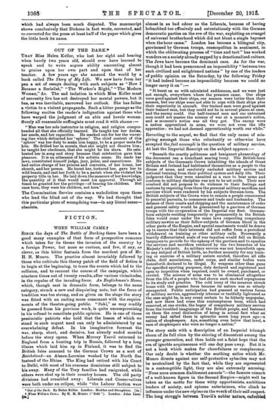OUT OF THE DARK.*
THAT Miss Helen Keller, who lost her sight and hearing when barely two years old, should ever have learned to speak and to write argues ability amounting almost to genius upon her own part and upon that of her teacher. A few years ago she amazed the world by a book called The Story of My Life. We now have from her pen a set of essays dealing with such subjects as "How I Became a Socialist," "The Worker's Right," "The Modern Woman," &c. The sad isolation in which Miss Keller must of necessity live has not destroyed her mental powers, but it
has, as was inevitable, narrowed her outlook. She has fallen a victim to a violent propaganda. Such a bitter passage as the following excites the reader's indignation against those who have warped the judgment of an able and heroic woman. Surely all reasonable suffragists must read it with shame :—
" Man was her sole instructor in religion, and religion compre- hended all that she officially learned. He taught her her duties, her needs, and her capacities. He marked out for her the waver- ing line which delimited her 'sphere.' The chief content of this ' sphere' was her duty to make him happy, to be a proper mate for him. He drilled her in morals, that she might not deceive him ; he taught her obedience, that she might be his slave. He cele- brated her in song and story because that celebration gave him pleasure. It is an utterance of his artistic sense. He made her laws, constituted himself judge, jury, jailer, and executioner. He bad entire charge of her prisons and convents, of her house, her church, and her person. He burnt her, tortured her, gave her to wild beasts, and cast her forth to be a pariah when she violated his property title in her. He laid down the measure of her knowledge, the quantity of it that would meet his approval. Through all times he granted her the privilege—of bearing his children. But once born, they were his children, not hers."
The Commination Service contains a malediction upon those who lead the blind out of the way. We had thought that this particular piece of wrongdoing was—in any literal sense— obsolete.










































 Previous page
Previous page